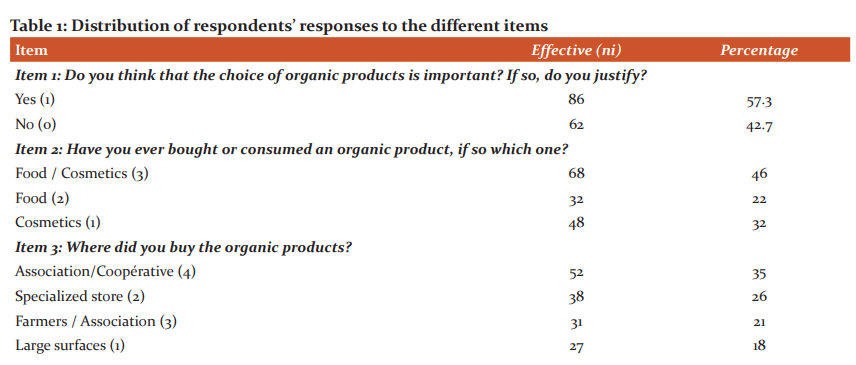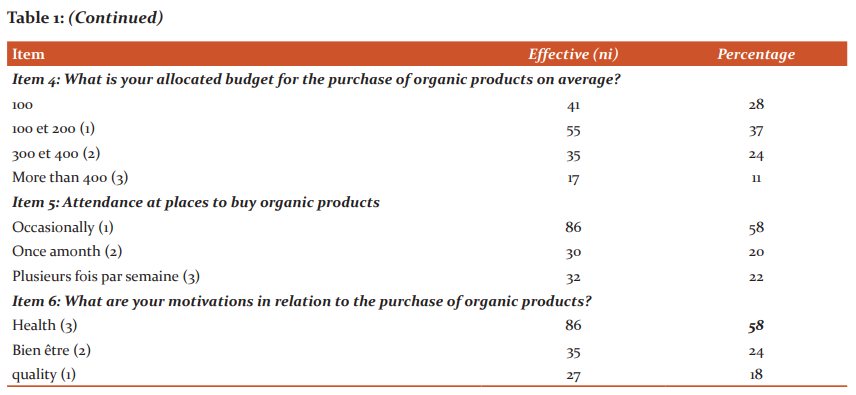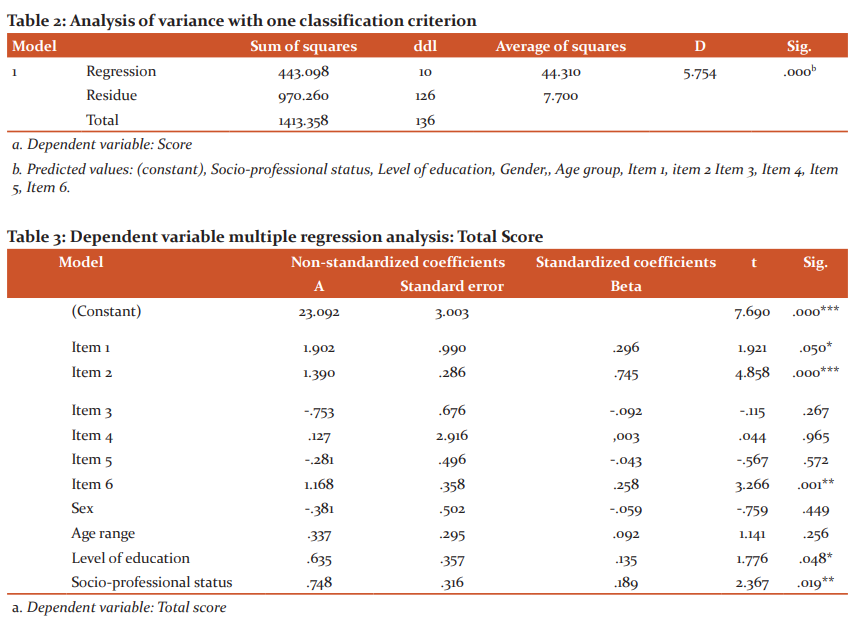IJCRR - 14(3), February, 2022
Pages: 19-23
Date of Publication: 01-Feb-2022
Print Article
Download XML Download PDF
Degree of Confidence in the Choice of Organic Products and its Determining Factors: Case of the Moroccan Consumer
Author: Saad H, Bennani B
Category: Healthcare
Abstract:In recent years, organic products have been at the heart of the news. Many people take a particular interest in the consumption of organic products, unlike those of conventional agriculture. This trend is determined by the degree of confidence that these people can place in an organic products. The estimation of this degree is of practical utility. In this present work, our objective consists in a contribution to developing the levels of confidence in respondents to certain determinants as well as the factors, which direct this confidence. We, therefore, conducted a prospective survey through a questionnaire of 148 respondents, 54.7% of whom are female. A Cronbach's alpha index (= 0.777) gave very accepted reliability (0.777) for this questionnaire. The results show that 57.3% of respondents gave confidence to organic products. This percentage remains much lower than that of France (95% \? and that of Tunisia (62.5%). The study shows to preserve the environment and consumer health, it is therefore important to develop this mode of production. It shows, moreover, that 58% of our respondents buy their \"organic\" products occasionally, a result similar to that reported in 2017 in France and that, for Morocco, these products are rarely purchased from supermarkets. The results show that, for those who include \"organic\" ingredients in their food, the budget allocated to the purchase of this product is between 100 and 200 MAD.
Keywords: Organic product, Food, Confidence, Determining factors, People surveyed, Morocco
Full Text:
INTRODUCTION
Across the world people are increasingly engaged in responsible consumption with the purchase of sustainable and environmentally friendly products.1 This trend shows that these products are gradually occupying a prominent place in the consumption habits of organic products. Qualifying an organic product must ensure that its production has been carried out under healthy conditions, without the use of chemicals or pharmaceuticals. The consumption of a food product cannot, therefore, be considered trivial insofar as it corresponds to the incorporation by the consumer of a foreign body Sirieix, (1999).2 unlike many countries around the world, in Morocco there are no studies that have looked at this consumer trend. In France for example, according to the French Ministry of Agriculture and Food (2019), more than 9 in 10 French people (92%) report having consumed organic products in 2018.3 In addition, in France, a study shows that more than 30% of French people believe that it is normal to pay more for organic products.4 Furthermore, according to Slim Kabbaj (2019), President of the Club des entrepreneurs Bio (CEBio), in Morocco, the first organic productions date back to 1986 and in 1919 the area devoted to organic farming in Morocco reached 11,000 hectares, i.e. an increase of almost 50% compared to the last ten years. Usually, this type of agriculture involves fruits, market garden plants and aromatic, medicinal and condiment herbs. This new activity constitutes an emerging economic sector, so the identification of organic consumption values ??is an issue of concern to marketing researchers.5 However, many studies have concerned organic products in America and Europe, but in Morocco, little research has started on this subject despite the efforts undertaken. It is with this in mind that we proposed to contribute to this research by conducting a prospective study on confidence in the consumption of organic products and the link with certain socio-demographic factors.
METHODOLOGY
We have adopted a method of descriptive and analytical analysis based on a survey of a sample of 148 respondents. The means chosen for data collection is the questionnaire. Data analysis is performed by SPSS 12 software.
• Study area and population
The data is collected following invitations by email. Guests are expected to complete a questionnaire covering certain socio-demographic criteria.
• Data collection tool
The questionnaire is made up of 6 items, the choice of which is inspired by a bibliographical summary on work already carried out around the world. The questionnaire is composed of two parts: a part reserved for questions on the socio-demographic and professional profile and a second part intended for the questionnaire itself which is made up of 6 items.
Items 1: Do you think that the choice of organic products is important? If so, do you justify it?
Item 2: Have you ever bought or consumed an organic product, if so which one?
Item 3: where did you buy the organic products?
Item 4: What is your allocated budget for the purchase of organic products on average?
Item 5: Attendance at places to buy organic products
Item 6: What are your motivations of purchase organic products?
The data after collection and filtration are subjected to descriptive and analytical analyzes by the SPSS 12 software (trial version).
RESULTS
1. Description of people surveyed
The survey covers 148 respondents, 54.7% (n=81) of whom are female. In addition, 47.3% (n=67) are under 30 years old, 48% are between 30 and 50 years old and 4.7% are over 50 years old. Regarding the educational level of respondents, 57.3% have a level between 3 and 5 years after the baccalaureate and 26.7% have a baccalaureate-level over 5 years. The majority of respondents are students or civil servants.
2. Study of the distribution of respondents' responses
Table (1) below shows the results of the distribution of responses to the various items of the questionnaire proposed for the state of confidence. Remembering that the reliability showed a very important Cronbach index (index = 0.777).
1. Do you think that the choice of organic products is important? If so, do you justify it?
The breakdown of respondents according to their answers to this question shows that 57.3% (n = 86) said “yes” against 42.7% (n = 62) who answered “No”. The respondents who answered “yes” justified this for many reasons. Indeed, 41.86% (n = 36) declared that in principle, the choice of organic products helps to guide the deployment of policies in favor of responsible production on the part of organizations. But in fact, since we are in a capitalist system, it is very difficult to produce this policy, while 44.19% (n = 38) justified their answer by the fact that the use of organic products is in close relationship with the environment, society, this responsibility is to be passed on to subsequent generations, so we must be careful what we consume and how we consume it. We should not therefore exaggerate but make our consumption optimal. On the other hand, it is favorable to sustainable development to preserve resources, not to encroach on the resources of future generations to ensure the sustainability of the quality of life for future generations because the environmental situation and of the climate is deteriorating day after day. 13.96% responded that this practice is for the preservation of health.
2. Have you ever bought or consumed an organic product, if so which one?
The figure below shows the results of the responses to the question "Have you ever bought or consumed an organic product, if so which". Indeed, 46% of respondents said they bought or consumed the food or cosmetic products. However, 22% bought food products only, and 17% cosmetic products.
3. Where did you buy the organic products?
The results concerning this question show that 35% of respondents choose to buy organic products from associations and cooperatives while 26% buy them in specialized stores. 21% say they buy these products from farmers and / or associations. Likewise, 18% of respondents said they are comfortable with supermarkets. Studies carried out in France show that 65% of purchases are made in medium-sized stores.
4. What is your allocated budget before buying organic products on average?
The results of the budgets reserved for the purchase of organic products. As a result, 37% of respondents declared spending between 100 and 200 MAD and 24% between 300 and 400 MAD. However, 24% answered spending between 300 and 400 MAD.
5. Regarding the question concerning the frequentation of places of purchase of organic products:
The results show 58% said that occasionally while 20% declared that they frequented places of sale once a month and the same frequency for those who responded several times a week.
6. What are your motivations in relation to the purchase of organic products?
The breakdown of responses to this question shows that 58% say that the motivation to consume organic products is health, 24% it is for well-being and 18% answer that it is product quality.
3. Global analysis
The degree of confidence is obtained by summing the response levels according to the corresponding scale. The average score is 87.23 ± 3.09, this score fluctuates between 5 points as a minimum value and a maximum score of 16 points. The distribution meets the standards of a Gaussian law (skewness coefficient = 0.11 and a kurtosis of 0.99). In fact, given the absence of a standard, we referred to the median value which corresponds to 85.01; 50% of respondents had a score below the median value therefore considered to have a degree of confidence varies from a low to moderate degree and the remaining 50% where the score is greater than the median value are respondents with a degree of confidence. Trust acceptable to best.
To look for certain factors related to this behavior, we used a multiple regression analysis whose dependent variable is the score and the explanatory variables are mentioned in the table below. Analysis of variance shows a very highly significant effect (Fisher = 5.754. P <0.000) (Table 2). However, this analysis confirms the compatibility of the chosen variables with each other and with the explained variable.
Table (3) below shows the results of the multiple regression analysis. In addition, all the required variables entered are introduced and none have been excluded. These independent variables explained more than 56% of the total variation (coefficient of determination = 0.561) with a standard error of 2.77. Indeed, the variables which showed a significant association with the predicted variable are:
• Item 1 “Do you think that the choice of organic products is important? If so, do you justify? »Is positively correlated with the degree of confidence, which explains why people who think about the choice of organic products have great confidence in them.
• Item 2 "Have you ever bought or consumed an organic product, if so which one" the latter is positively correlated with the total score. Indeed, people who trust organic products tend to use them for food and cosmetics.
• Item 6 "What are your motivations in relation to the purchase of organic ". The correlation is positive between the predicted variable and item 6, which explains why the trend for buyers of these products is for health purposes.
• The level of training and socio-professional status have a very significant effect on the degree of confidence of the people surveyed. Having a high educational level and an accepted financial level are two factors that most likely result in a significant degree of confidence. In the light of these results, the model chosen to estimate the degree of confidence by taking into account all the variables introduced therefore made it possible to develop a linear equation whose explanatory variables are the state of confidence granted to these products, especially the products with food and cosmetic tendencies and which are used for sanitary purposes.
DISCUSSION
The choice of the subject comes to enrich the Moroccan literature on organic products while being based on the statements underlined by the respondents of a lot of surveys carried out in Morocco. However, these respondents also underline that there is little social debate concerning the consumption of organic products, the advantages and the disadvantages.6 The results of our survey are of great importance compared to studies conducted elsewhere. Indeed, 57.3% of respondents gave confidence to organic products. In France, the results, posted since 2015 show that the confidence of the French in organic products has stabilized at 95%.7 They believe, that it is important to develop this mode of production to preserve the environment and their health. According to a Tunisian study conducted by Kaouther et al. 2014.8It shows that 62.5% had confidence in the product consumed. In our study, 58% of respondents were motivated to preserve their health this argument is reported in several studies around the world such as.8,9,10 In parallel to this, two other reasons were also noted: for the quality and taste of the products, as well as for the preservation of the environment. However, 58% of our respondents answered that they frequent places of purchase on an occasional basis, a result close to that declared in France in 2017 (51%). Of all those surveyed, 18% approved buying organic products from supermarkets, this result is far from the figures recorded in a study conducted in France where the rate reached 68% (SRD, 2014). According to 37% of our respondents, the budget allocated to the purchase of BIOS products is between 100 and 200 MAD, this result is close to that mentioned in a study conducted in France where the majority (56%) do not spend more than 25 euros per week, and only 8% of consumers spend more than 50 euros on natural products.
CONCLUSION
The results show that for our surveyed population, only 57.3% trusted organic products, this result is lower than those of France (95%) and Tunisia (62.5%). Likewise, for consumers of “organic” products, only 100 and 200 MAD are allocated as a budget for this type of product, often acquired in small commercial areas (Association / Cooperative and Specialized store). The results also show that 58% of our respondents buy their products their "organic" products occasionally and that the budget allocated to the purchase of this product is between 100 and 200 MAD.
In addition, the choice of organic products remains a priority for many people because of several reasons related to health, the environment and thus quality. In Morocco, despite the efforts made by those in charge, this sector has yet to be redesigned in view of the agrarian potential that Morocco has. By intensifying studies of this kind we can improve the philosophy of people to trust in the consumption of organic products. The Green Morocco Revolution can help young developers to improve this sector through direct involvement by providing them with material subsidies and this is really the trend of the Moroccan government in recent years. Likewise, to protect the environment and their consumer health, it is therefore important to develop this mode of production.
Acknowledgement:
We are grateful to authors/editors/publishers of all those articles, journals and books from where the literature for this article has been reviewed and discussed.
Source of funding: Nil
Conflict of Interest: Nil
Authors’ Contribution:
Saad Hind: Writing the article
Bennani Bouchra: Final approval of the article



References:
-
Schifferstein HN, Ophuis,.
-
Sirieix La L. Consommation alimentaire: problématiques, approches et voies de recherche. Recherche et Applications en Marketing (French Edition); 1999;14 (3): 41-58.
-
De Montzey S., De Jubecourt D.
-
Rivière-Wekstein G. Bio fausses promesses et vrai marketing. Le Publieur ;2012; pp130-136.
-
Lin P C, Huang YH. The influence factors on choice behavior regarding green products based on the theory of consumption values. J. Clear. Pro;2012;22 (1): 11-18.
-
Vega-Zamora M, Torres-Ruiz FJ, Murgado-Armenteros EM, Parras-Rosa, M. Organic as a heuristic cue: What Spanish consumers mean by organic foods. Psychology & Marketing; 2014; 31(5): 349-359.
-
Kesse-Guyot E, Peneau S, Mejean C, de Edelenyi FS, Galan P, Hercberg S et al. Profiles of organic food consumers in a large sample of French adults: results from the Nutrinet-Sante cohort study. PloS one; 2013;8(10): e76998.
-
Kaouther G, Rym K, Basma B A. Le marché des produits bio en Tunisie: Mythe ou Réalité pour les Enseignes de la Grande Distribution. Revue Marocaine de Recherche en Management et Marketing; 2014 ; 9(10): 189-207.
-
Sylvander B. Les tendances de la consommation de produits biologiques en Europe : conséquences sur les perspectives d’évolution du secteur, contribution au colloque. Organic agriculture faces its development, the future issues;1999 ;pp 320.
-
Zanoli RS, Naspetti S. Consumer motivations in the purchase of organic food, Brit. Fo.J; 2002;104 (8): 643-65
|






 This work is licensed under a Creative Commons Attribution-NonCommercial 4.0 International License
This work is licensed under a Creative Commons Attribution-NonCommercial 4.0 International License